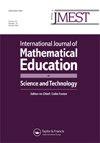Teacher tensions: managed or resolved
IF 0.6
Q3 EDUCATION & EDUCATIONAL RESEARCH
International Journal of Mathematical Education in Science and Technology
Pub Date : 2023-05-07
DOI:10.1080/0020739X.2023.2190328
引用次数: 0
Abstract
Teacher practice is rife with tensions. Tensions around what and how best to teach, how to manage situations with students, and how to manage situations with colleagues, administrators, and parents. These tensions are often seen as pairs of opposing internal and external forces: this assessment is better, but it takes a lot of time. These forces are inescapable, and teachers have to learn to either manage them or resolve them. In this paper we look closely at tensions through the lens of opposing forces and, more interestingly, how teachers either learn to live with them or work to resolve them. And, in particular, we look at how this work differs if the tension exists between internal forces, external forces, or a tension between an internal and external force. Drawing on case studies of seven different participants we dive deep into the murky world of the lived experiences of teachers to understand better the way that tensions contribute to their beliefs, decisions, and actions.教师关系紧张:管理或解决
教师实习充满了紧张气氛。围绕什么和如何最好地教学,如何与学生一起管理情况,以及如何与同事、管理人员和家长一起管理情况的紧张关系。这些紧张局势通常被视为对立的内部和外部力量:这种评估更好,但需要大量时间。这些力量是不可避免的,教师必须学会管理它们或解决它们。在这篇论文中,我们通过对立力量的视角来密切关注紧张局势,更有趣的是,我们还了解了教师是如何学会与紧张局势共存或努力解决紧张局势的。特别是,如果张力存在于内力、外力之间,或者内力和外力之间,我们会观察这项工作的不同。通过对七名不同参与者的案例研究,我们深入了解了教师生活经历的阴暗世界,以更好地了解紧张情绪对他们的信仰、决定和行动的影响。
本文章由计算机程序翻译,如有差异,请以英文原文为准。
求助全文
约1分钟内获得全文
求助全文
来源期刊

International Journal of Mathematical Education in Science and Technology
EDUCATION & EDUCATIONAL RESEARCH-
CiteScore
3.30
自引率
11.10%
发文量
123
期刊介绍:
Mathematics is pervading every study and technique in our modern world, bringing ever more sharply into focus the responsibilities laid upon those whose task it is to teach it. Most prominent among these is the difficulty of presenting an interdisciplinary approach so that one professional group may benefit from the experience of others. The International Journal of Mathematical Education in Science and Technology provides a medium by which a wide range of experience in mathematical education can be presented, assimilated and eventually adapted to everyday needs in schools, colleges, polytechnics, universities, industry and commerce. Contributions will be welcomed from lecturers, teachers and users of mathematics at all levels on the contents of syllabuses and methods of presentation.
 求助内容:
求助内容: 应助结果提醒方式:
应助结果提醒方式:


